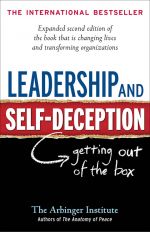Правообладателям!
Представленный фрагмент книги размещен по согласованию с распространителем легального контента ООО "ЛитРес" (не более 20% исходного текста). Если вы считаете, что размещение материала нарушает ваши или чьи-либо права, то сообщите нам об этом.Читателям!
Оплатили, но не знаете что делать дальше?
Текст бизнес-книги "Leadership and Self-Deception. Getting out of the Box"
Автор книги: Arbinger Institute
Раздел: Зарубежная деловая литература, Бизнес-книги
Возрастные ограничения: +12
Текущая страница: 1 (всего у книги 1 страниц)
Leadership and Self-Deception
Praise for Leadership and Self-Deception
“Extraordinary … Five Stars.”
– Business Ethics
“This is the most profound and practical business book I have ever read! Everyone I have recommended this book to has been challenged intellectually and also touched emotionally. It is a must-read that I will give to my kids to read before they begin their careers.”
– Tom A. DiDonato, Vice President, Human Resources, American Eagle Outfitters
“I love this book. It identifies the central issue in all organizational performance. Like truth itself, this book reveals more with each re-examination. I highly recommend it.”
– Doug Hauth, Business Development Manager, Convio, Inc.
“Imagine working in an organization where the aim of your colleagues is to help you achieve your results. I could not believe it possible. After reading this book I just had to bring Arbinger to the UK to teach our people. What an experience! We are all better people for it. This book touches the very foundation of culture, teamwork, and performance.”
– Mark Ashworth, President and CEO, Butcher’s Pet Care, UK
“It’s rare to find a business book that is good enough to recommend to your boss, your work team, and your friends. The concepts in this book have transformed both the way I work and the way I live.”
– Robert W. Edwards, Managing Director, Sales, FedEx
“After decades of executive leadership in senior management positions, I’ve finally found in Arbinger what I consider to be the best means of improving every measure of success. From boosting the bottom line to increasing personal joy, this book shows the way.”
– Bruce L. Christensen, former President and CEO, PBS
“This astonishing book is a MUST-read for every executive or personal and professional coach.”
– Laura Whitworth, coauthor of Co-Active Coaching, and cofounder, The Coaches Training Institute
“The concepts in this book are powerful. They are fundamental to success whether on the playing field, in the office, or perhaps most importantly, at home. Read this book and you’ll see what I mean.”
– Steve Young, two-time NFL Most Valuable Player
“Rarely has a book had such an immediate and profound impact on the hundreds of CEOs of fast-growth firms we work with through our MIT/Inc./EO Executive Program. And it’s one of those rare books that touches both the personal as well as professional lives of these leaders.”
– Verne Harnish, cofounder, Entrepreneurs’ Organization, and CEO, Gazelles, Inc.
“Leadership and Self-Deception is a touchstone for authentic leadership. Arbinger’s innovative exploration of what lies beneath behavior uplifts, enlightens, and transforms. We’ve wholeheartedly adopted Leadership and Self-Deception as the foundational material for our administrator development program.”
– Troy S. Buer, Educational Program Director, University of Virginia School of Medicine
“This is probably the most outstanding book that directs us to soul searching and introspection. It teaches us to take accountability for our lives and our destinies in a down-to-earth and bluntly practical manner. The lessons in this book have helped me personally, as well as other people I love.”
– Kalyan Banerjee, cofounder and Senior Vice President, MindTree
“The principles of Leadership and Self-Deception provide the groundwork for our success as individuals and organizations. I recommend it highly to my fellow board members, to global networks, corporate clients, entrepreneurs, and individuals alike.”
– Heidi Forbes Öste, CEO and founder, 2BalanceU, and Public Relations, Europe Region, Business and Professional Women International
“While reading, I reviewed my life, and, sure enough, what successes there were in it were based on Arbinger’s principles. This book is a tool that could transform and elevate the way government functions!”
– Mark W. Cannon, former Administrative Assistant to the Chief Justice of the United States and Staff Director, Commission on the Bicentennial of the U.S. Constitution
“Because it distills important leadership, spiritual, and life principles into one profound and impossible-to-put-down book, Leadership and Self-Deception is a treasure. MBA students in my classes share my enthusiasm for this rare book. You will surely return to this book again and again; and each time you do, it will be as penetrating a learning experience as the first time.”
– Barry Brownstein, CSX Chair in Leadership, University of Baltimore
“The leadership principles in this book have had a greater impact on the quality of leadership in our company than anything we have ever implemented. They have been extraordinarily important in helping make our company a great place to work while at the same time helping us focus on results and increase productivity as never before.”
– Michael Stapley, President and CEO, DMBA
“Simple … clear … powerful. With many years of experience in leadership, organizational development, and training I was surprised to find something strike me with such impact.”
– Janet Steinwedel, President, Leader’s Insight
“As a therapist I was pleasantly surprised to find that a book geared toward managers could have such far-reaching implications in my life and the lives of my clients. I believe the ideas in this book could transform the counseling profession. It is now required reading for all my clients.”
– Jason Beard, family therapist
“Are you relating to the world anxiously or angrily, not comprehending why you hold judgmental attitudes, feel uncontrollable fear, or unleash explosions of temper against your colleagues without being able to explain why? Do you feel hopeless and unable to change? Learn the practical tools provided in this fascinating book and eliminate this problem at its source right now!”
– Marcos Cajina Heinzkill, Certified Coach and Facilitator, founder and President, Renewal, Spain
“Remarkable. Arbinger possesses the hidden key to productivity and creativity. Do whatever you can to get your hands on this material.”
– Dave Browne, former President and CEO, LensCrafters
“This book is a rare gem that is treasured by all who have read it. The organization for which I work has passed this book to so many people, and it is amazing to watch peoples’ attitudes and behaviors toward each other changing. Each day everyone gives a little more, making us better leaders, but more importantly, better people.”
– Nuala Murphy, Senior Vice President, Global Financial Services Company
“Leadership and Self-Deception holds up a brutally honest mirror to behavior in which we all indulge to justify our shortcomings. The result is not self-remorse or punishment but a glimpse of a life to be lived with integrity and freed of the boundaries and constraints we inflict upon ourselves and others. I am always excited to watch Arbinger’s thinking help my clients to unlock painful family disputes and lead them to resolution.”
– Neil Denny, family lawyer, Wiltshire, UK
“A remarkable book. It can be valuable to your understanding of why so many people create their own problems, are unable and/or unwilling to see that they are creating their own problems, and then resist any attempts by others to help them stop creating those problems.”
– Robert Morris, Amazon Top 50 Reviewer
“I’ve been in the book publishing business for twenty-five years. Rarely have I read a book as profound and life-changing as Leadership and Self-Deception.”
– David Sanford, Literary Agent, Credo Communications
“This book was recommended to me at an annual strategic planning session. I was stunned by the truth of it and the simple solution. Our entire management has now read it. It has been a building block for our personal and organizational development.”
– Rick Chalk, CEO, Cal-Tex Protective Coatings
“My business partners and I built a health-care company on the ideas in this book. We are amazed at what it has helped us achieve. Careful reading and rereading of this book has proven better than any productivity, team-building, or leadership training we’ve encountered.”
– Mark Ballif, CEO, Plum Healthcare
Preface
For too long, the issue of self-deception has been the realm of deep-thinking philosophers, academics, and scholars working on the central questions of the human sciences. The public remains generally unaware of the issue. That would be fine except that self-deception is so pervasive that it touches every aspect of life. “Touches” is perhaps too gentle a word to describe its influence. Self-deception actually determines one’s experience in every aspect of life. The extent to which it does that – and in particular the extent to which it determines the nature of one’s influence on, and experience of, others – is the subject of this book.
To give you an idea of what’s at stake, consider the following analogy. An infant is learning how to crawl. She begins by pushing herself backward around the house. Backing herself around, she gets lodged beneath the furniture. There she thrashes about, crying and banging her little head against the sides and undersides of the pieces. She is stuck and hates it. So she does the only thing she can think of to get herself out – she pushes even harder, which only worsens her problem. She’s more stuck than ever.
If this infant could talk, she would blame the furniture for her troubles. After all, she is doing everything she can think of. The problem couldn’t be hers. But of course the problem is hers, even though she can’t see it. While it’s true that she’s doing everything she can think of, the problem is precisely that she can’t see how she’s the problem. Having the problem she has, nothing she can think of will be a solution.
Self-deception is like this. It blinds us to the true causes of problems, and once we’re blind, all the “solutions” we can think of will actually make matters worse. Whether at work or at home, self-deception obscures the truth about ourselves, corrupts our view of others and our circumstances, and inhibits our ability to make wise and helpful decisions. To the extent that we are self-deceived, both our happiness and our leadership are undermined at every turn, and not because of the furniture.
We have written this book to educate people about a solution to this most central of problems. Our experience in teaching about self-deception and its solution is that people find this knowledge liberating. It sharpens vision, reduces feelings of conflict, enlivens the desire for teamwork, redoubles accountability, magnifies the capacity to achieve results, and deepens satisfaction and happiness. This is true whether we are sharing these ideas with corporate executives in New York, governmental leaders in Beijing, community activists on the West Bank, or parenting groups in Brazil. Members of every culture participate to one degree or another in their own individual and cultural self-deceptions. The discovery of a way out of those self-deceptions is the discovery of hope and the birth of new possibilities and lasting solutions.
This book was first published in 2000, with the paperback appearing in 2002. In this new edition, published in 2010, the text has been updated, and we have added a section at the end that describes the various uses people have made of the book and its ideas over the last decade. Initially, some readers are surprised to find that the book unfolds as a story. Although fictional, the characters’ experiences are drawn from our own and our clients’ actual experiences, so the story rings true, and most readers tell us that they see themselves in it. Because of this, the book delivers not just conceptual but also practical understanding of the problem of self-deception and its solution. The resulting impact has made Leadership and Self-Deception an international bestseller that is now available in over 20 languages. Our most recent bestseller, The Anatomy of Peace, published in hardcover in 2006 and in paperback in 2008, builds on both the story and the ideas developed in Leadership and Self-Deception. Individually and together, these books help readers to see their work lives and home situations in entirely new ways, and to discover practical and powerful solutions to problems they were sure were someone else’s.
We hope that this introduction to the self-deception problem and solution will give people new leverage in their professional and personal lives – leverage to see themselves and others differently, and therefore leverage to solve what has resisted solution and to improve what can yet be improved.
A Note about the Book
Although based on actual experiences in our work with organizations, no character or organization described in this book represents any specific person or organization. However, the information that appears about Ignaz Semmelweis is a historical account drawn from the book Childbed Fever: A Scientific Biography of Ignaz Semmelweis, by K. Codell Carter and Barbara R. Carter (Transaction Publishers, 2005).
PART I
Self-Deception and the “Box”
1 Bud
It was a brilliant summer morning shortly before nine, and I was hurrying to the most important meeting of my new job at Zagrum Company. As I walked across the tree-lined grounds, I recalled the day two months earlier when I had first entered the secluded campus-style headquarters to interview for a senior management position. I had been watching the company for more than a decade from my perch at one of its competitors and had tired of finishing second. After eight interviews and three weeks spent doubting myself and waiting for news, I was hired to lead one of Zagrum’s product lines.
Now, four weeks later, I was about to be introduced to a senior management ritual peculiar to Zagrum: a daylong one-on-one meeting with the executive vice president, Bud Jefferson. Bud was the right-hand man to Zagrum’s president, Kate Stenarude. And due to a shift within the executive team, he was about to become my new boss.
I had tried to find out what this meeting was all about, but my colleagues’ explanations confused me. They mentioned a discovery that solved “people problems”; how no one really focused on results; and that something about the “Bud Meeting,” as it was called, and strategies that evidently followed from it, was key to Zagrum’s incredible success. I had no idea what they were talking about, but I was eager to meet, and impress, my new boss.
Bud Jefferson was a youngish-looking 50-year-old combination of odd-fitting characteristics: a wealthy man who drove around in an economy car without hubcaps; a near–high school dropout who had graduated with law and business degrees, summa cum laude, from Harvard; a connoisseur of the arts who was hooked on the Beatles. Despite his apparent contradictions, and perhaps partly because of them, Bud was revered as something of an icon. He was universally admired in the company.
It took 10 minutes on foot to cover the distance from my office in Building 8 to the lobby of the Central Building. The pathway – one of many connecting Zagrum’s 10 buildings – meandered beneath oak and maple canopies along the banks of Kate’s Creek, a postcard-perfect stream that was the brainchild of Kate Stenarude and had been named after her by the employees.
As I scaled the Central Building’s hanging steel stairway up to the third floor, I reviewed my performance during my month at Zagrum: I was always among the earliest to arrive and latest to leave. I felt that I was focused and didn’t let outside matters interfere with my objectives. Although my wife often complained about it, I was making a point to outwork and outshine every coworker who might compete for promotions in the coming years. I nodded to myself in satisfaction. I had nothing to be ashamed of. I was ready to meet Bud Jefferson.
Конец ознакомительного фрагмента.
Текст предоставлен ООО «ЛитРес».
Прочитайте эту книгу целиком, купив полную легальную версию на ЛитРес.
Безопасно оплатить книгу можно банковской картой Visa, MasterCard, Maestro, со счета мобильного телефона, с платежного терминала, в салоне МТС или Связной, через PayPal, WebMoney, Яндекс.Деньги, QIWI Кошелек, бонусными картами или другим удобным Вам способом.
Внимание! Это ознакомительный фрагмент книги.
Если начало книги вам понравилось, то полную версию можно приобрести у нашего партнёра - распространителя легального контента ООО "ЛитРес".Правообладателям!
Представленный фрагмент книги размещен по согласованию с распространителем легального контента ООО "ЛитРес" (не более 20% исходного текста). Если вы считаете, что размещение материала нарушает ваши или чьи-либо права, то сообщите нам об этом.Читателям!
Оплатили, но не знаете что делать дальше?







